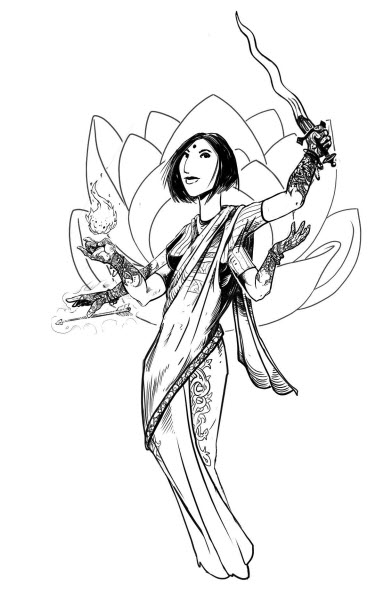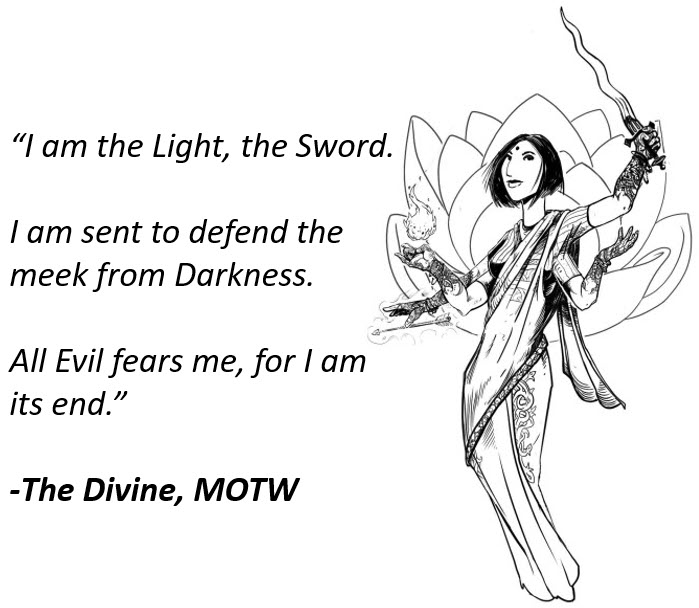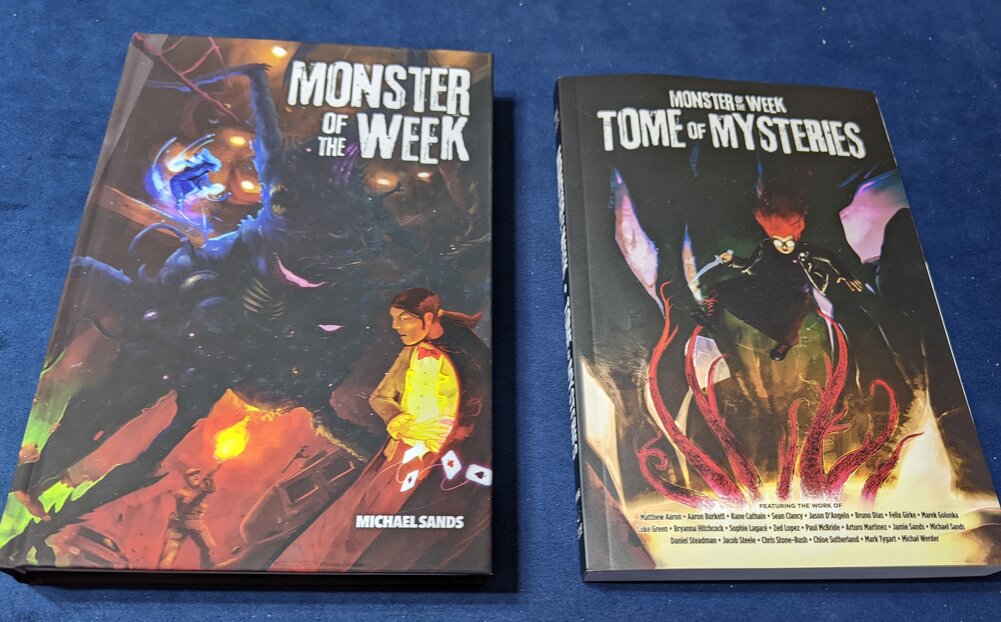The Divine Class is one of those that can be interesting, either taking on the conventional role of a holy warrior like a paladin or angelic prophet, or putting your own spin on it. After all, you are divine in the cause of good – but no specific mention of which you serve. A god? The god? A general good or forgotten demi-god?
Based on the writing you have to be good aligned if you are looking to eliminate evil but other than that – it’s an open field which direction you go with being a representative of the vengeful hand of good, here to smite evil.
I am the Light, the Sword.
I am sent to defend the meek from Darkness.
All Evil fears me, for I am its end.
The Divine, p.41 Monster of the Week
Just take a look at the book’s illustration of the Divine to get a really good idea of the many various ways this figure can appear – and it’s pretty freaking cool.

So let’s dive further into MOTW Divine Class to learn all there is to know about this system’s version of a blessed Holy Warrior.
What Is The Divine Class In Monster of the Week RPG?
The Divine Class is here to destroy evil. Their marks might be hidden or might be obvious. They carry a divine weapon that can be anything from a flaming sword to a 5 demon bag to a silver trident. They also get +1 Divine Armor as no Deity would send a champion down to Earth completely unprotected.
Not with such an important task to oversee.
The specific Mission of a Divine will bring a lot of flavor to how they play and what their goals are. This could be simple such as being here to fight the schemes of an Adversary.
The End of Days could be approaching and your mission might be to guide hunters to prevent it…or even to make sure it happens.
You might be there to protect a Hunter who has a key role in an upcoming prophecy, or went rogue to “do good” and know that your former brothers and sisters would attempt to kill you on sight if they found you.
Each of these brings an extremely interesting and different point of view as to how you may choose to play your Divine Class player in your next Monster of the Week game and how they might approach any given challenge.
What Type of Divine Will You Be?
In the same way that the Monster of the Week Flake class can be summarized as “Sharp and ?” you can look at the Divine as “Tough and ?” Every single starting rating for the Divine starts with a +2 Toughness which makes sense.
You have to be tough to deal with the evil supernatural entities that plague the world. Especially since they’re not likely to play fair or merciful.
The Divine Ratings for MOTW Are
- +2 Tough & Cool, 0 Weird, -1 Charm & Sharp
- +2 Tough, +1 Cool & Charm, 0 Weird, -1 Sharp
- +2 Tough, +1 Cool & Charm, 0 Sharp, -1 Weird
- +2 Tough, +1 Sharp & Weird, 0 Cool, -1 Charm
- +2 Tough, +1 Cool & Weird, 0 Sharp, -1 Charm
If you’re going to take on the worst the supernatural world can throw at you, deal with end of the world events, or act as bodyguard to another hunter, you had better be able to hold your own.
The Divine gets very cool weapons that can take many forms, and is one of the major aesthetic plusses (not to mention the ability to do serious damage mechanically) that makes the Divine class so attractive.
Their specific relationships with other players are customized to their background and what they are in ways I quite enjoy. This runs from “You’re the human I go to for advice on how to deal with or understand mortals” all the way to the crazy end of “You are an abomination and you should be destroyed, but I need to work with you for…reasons.”
This can create some really interesting and cool dynamics within the party.

What Do The Divine’s Moves Bring To The Table?
There are seven total moves that The Divine class can choose from, and you start out with three and can add up to two more through level ups. Let’s take a look at The Divine moves and what options they allow you to bring to the table with this class.
- Boss from Beyond – Being attached to some divine entity has its advantages! At the beginning of each mystery, roll +Weird. If you get a 10+ your Superiors ask you to do something simple. On a 7-9 they ask you to do a difficult or complicated thing. You get to ask one of the questions from the “Investigate A Mystery” move right now and get an honest answer, but if you don’t fulfill your side of the bargain later you can’t use this again until you’ve made up for your failure. On a failed roll, you are required to do something terrible.
- Angel Wings – You can instantly go anywhere you’ve visited before or to a person you know well. It succeeds if you go solo, if you carry one or two people with you then you need to roll +Weird. ON a 10+ you get where you wanted. On a 7-9 either you all get separated or you all appear in the wrong place.
- What I Need, When I Need It – You can store any small object you own in a magical space no one else can get to and can retrieve it any time you need – the item will just appear in your hand.
- Smite – You are a scourge to those who oppose you and both your body and divine weapon ALWAYS count as a weakness against any monster you fight. In this case your unarmed attacks are considered 2-harm intimate hand messy.
- Soothe – When you talk to someone for a few seconds in a quiet voice you can calm them down and block anger, panic, or any other negative emotions. This happens even if the cause of those feelings or freak out is still present. This is an EXCEPTIONAL Move and one that is extremely useful at some point in virtually any Investigation.
- Lay On Hands – Heal injury and disease with a touch. When you lay your hands on someone you can go for the good old fashioned faith healing move by rolling +Cool. On a 10+ you heal 2 harm or an illness and they are automatically stabilized. On a 7-9 you can heal the harm or illness on another person, but it comes at the cost of having to take it onto yourself. On a miss your aura causes extra harm.
- Cast Out Evil – Banish an unnatural creature from your presence. Roll +Tough (should be right up your alley) and on a 10+ it is immediately banished. On a 7-9 it takes a little while for the full banishing to take effect meaning the creature has time for one or two actions at the DM’s discretion. The banished creature is unharmed and you don’t control where it’s banished to. This move CAN be used on unnatural hunters like the Monstrous Class. On a failure that means something is binding the monster to this plane…which is generally very bad news for the team!
There are some situationally good abilities among these Moves, and several very powerful ones, as well. You can create a powerful Divine who is more than capable of throwing down during a fight, getting the group out of a tight spot, or even funneling knowledge from a higher power to help those on the ground.
They are a class that can do some pretty cool things and do very much remind me of a Paladin: a tough as nails class who can also do a little bit of a lot of other important things, as long as you don’t ask too much of them or press luck of your dice rolls too far.

Who Should Play The Divine Class in Monster of the Week?
If you love Paladins, Clerics, or even Celestial Warlocks in D&D then chances are The Divine class might be your thing. They tend to be a more martial class, built for combat and special abilities that are tied to the mission they are on thanks to whatever Divine hands guide them. This is a class that is likely to be less chaotic and more lawful or at least code bound in some way.
This still leaves plenty of wriggle room in that space in order to play a character the way you want, but it is a consideration worth making if you want to go this way. Understanding your Deity or what force guides you can really determine how you play it.
I told them ‘Bob sent me.’ When they looked confused, I said ‘You know, Bob.’ Then sighed and said ‘God.’ When one player made the mistake of asking if God’s name was Bob my Divine character answered ‘What else would it be? Alpha and Omega, same beginning and end, backwards or forwards, what other name would it be? Why do you think Dad and Mom are the words for parents? Same concept.’ It took a moment for the bad joke to sink in and the groans to come around the table. They were right to be angry with me.
Shane “Corrupt Overlord” on why he’s not allowed to play a Divine anymore
MOTW The Divine Class: Final Thoughts
I like the design of the Divine Class as it hits all the classic marks you would expect from a class with that name, while also providing some degree of flexibility to but your own flair or spin on it. If you’re going to be hunting monsters, it makes sense that something, somewhere, might decide that you need a little bit of help and send their helper with the explicit goal of aiding your group and guiding them to safety and victory in their pursuits.
There are enough potential twists in the class description (aiding the coming of the apocalypse, anyone?) that no two Divine characters in different campaigns need to be all that similar, but if you have a DM who is throwing down a rough and tumble style of high danger campaign, you’ll definitely be glad to have a Divine on your side!
Other TTRPG Articles You May Enjoy
- Monster of the Week The Chosen Class Guide
- Monster of the Week The Crooked Class Guide
- Monster of the Week The Pararomantic Playbook Reviewed
- Monster of the Week The Gumshoe Playbook Reviewed
- Monster of the Week Classes
- 5E Half Feats Guide
- 5E Half Casters Guide
- Best D&D Alternatives

Proud to embrace the locally created moniker of “Corrupt Overlord” from one of the all time great Lords of Waterdeep runs, Shane is one member of the Assorted Meeples crew and will be hard at work creating awesome content for the website. He is a long-time player of board games, one time semi-professional poker player, and tends to run to the quirky or RPG side of things when it comes to playing video games. He loves tabletop roleplaying systems like Dungeons & Dragons, Pathfinder, Werewolf, Fate, and others, and not only has been a player but has run games as DM for years. You can find his other work in publications like Level Skip or Hobby Lark.
